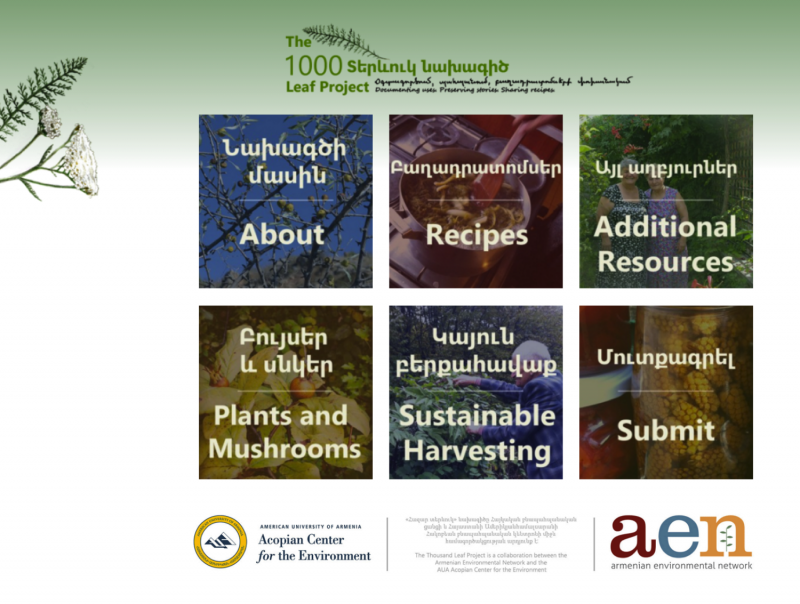
The Thousand Leaf Project Website Launched Jointly by the Armenian Environmental Network and the AUA Acopian Center for the Environment
2 min readYEREVAN, Armenia – The Thousand Leaf Project (http://1000leaf.aua.am) is a collaboration between the Armenian Environmental Network (AEN) and the American University of Armenia Acopian Center for the Environment (ACE). The website was launched on April 2, 2016 at the highly anticipated and well-attended Ecotourism Conference at the American University of Armenia.
The website aims to address the lack of accessible information on plants and mushrooms used by Armenians. It encourages individuals throughout Armenian communities across Armenia and the world (“citizen scientists”) to collect and submit information, stories, photos, and recipes. The website also provides information on sustainable harvesting methods to deter harmful practices. Responsible methods of harvesting are key to conserving these natural resources.
“We hope that Armenians inside and outside of Armenia will use this website to learn about and document traditional uses of wild plants and mushrooms. I personally love hiking in Armenia and seeing the incredible diversity of edible plants and hearing stories from residents about their unique traditional uses, which can vary significantly by region,” said AEN’s Executive Director, Serda Ozbenian. “We’re excited to have a place to house and preserve this information and to empower ordinary people to contribute to this cultural documentation effort.”
The project also hopes to foster an interest in visiting Armenia and to encourage responsible ecotourism by showcasing the rich biodiversity and offer a glimpse into the interesting gastronomic heritage of the country.
“This website offers us a great tool to show an important connection between human culture and wildlife,” said Alen Amirkhanian, Director of the AUA Acopian Center for the Environment. “It will not only help develop engaging information and activities for tourists visiting Armenia but also engage communities within Armenia to document the wild edibles and their uses in their families and communities.” Amirkhanian hopes that this will help increase awareness of the value that wildlife has in a community’s daily life. “School children can be engaged to collect information and recipes from their parents or grandparents, making the website a valuable tool for environmental education,” said Amirkhanian.
AEN and the AUA Acopian Center for the Environment will be initiating a dissemination campaign for this website targeted initially at rural communities. “One of the ideas we have is to organize a competition among schools in rural areas encouraging integration of the site in their curricular and extra-curricular activities,” said Marine Asatryan, Environmental Education and Youth Projects Coordinator at the AUA Acopian Center. Other paths to be pursued include linking to social media groups targeting rural communities and radio/TV coverage.
Visit The Thousand Leaf website to learn and contribute – http://1000leaf.aua.am.
The AUA Acopian Center for the Environment (AUA ACE) is a research center of the American University of Armenia. AUA ACE promotes the protection and restoration of the natural environment through research, education, and community outreach. AUA ACE’s focus areas include sustainable natural resource management, biodiversity and conservation, greening the built environment, clean energy and energy efficiency, as well as information technology and the environment.
The Armenian Environmental Network (AEN) is a project of Earth Island Institute, based in Berkeley, California. AEN’s mission is to increase information and engagement among Armenians, in Armenia and in the Diaspora, and the wider conservation community about environmental issues in Armenia, while facilitating environmentally sustainable development in Armenia through responsible partnerships of Diasporan and international resources.
The Armenian version of the article read here.


